译林牛津版小学六年级下册英语阅读理解练习题及答案
- 格式:doc
- 大小:94.50 KB
- 文档页数:10
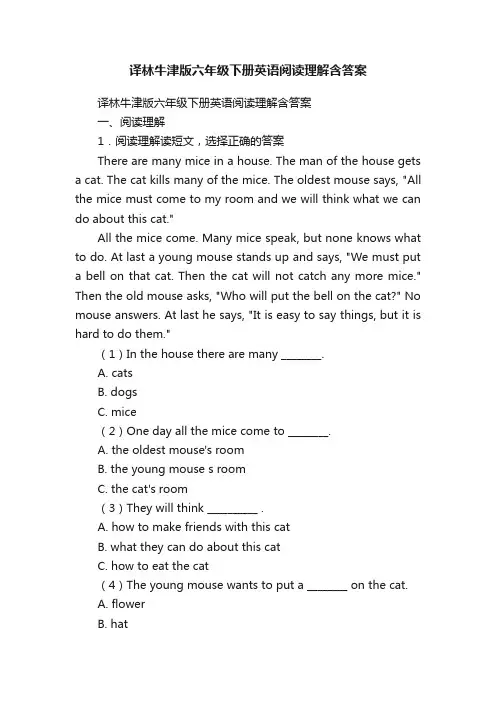
译林牛津版六年级下册英语阅读理解含答案译林牛津版六年级下册英语阅读理解含答案一、阅读理解1.阅读理解读短文,选择正确的答案There are many mice in a house. The man of the house gets a cat. The cat kills many of the mice. The oldest mouse says, "All the mice must come to my room and we will think what we can do about this cat."All the mice come. Many mice speak, but none knows what to do. At last a young mouse stands up and says, "We must put a bell on that cat. Then the cat will not catch any more mice." Then the old mouse asks, "Who will put the bell on the cat?" No mouse answers. At last he says, "It is easy to say things, but it is hard to do them."(1)In the house there are many ________.A. catsB. dogsC. mice(2)One day all the mice come to ________.A. the oldest mouse's roomB. the young mouse s roomC. the cat's room(3)They will think __________ .A. how to make friends with this catB. what they can do about this catC. how to eat the cat(4)The young mouse wants to put a ________ on the cat.A. flowerB. hatC. bell(5)"It is easy to say things, but it is hard to do them." means "________".A. 只说不做B. 说到做到C. 说起来容易做起来难【答案】(1)C(2)A(3)B(4)C(5)C【考点】阅读理解【解析】【分析】这是一篇关于老鼠的寓言故事。
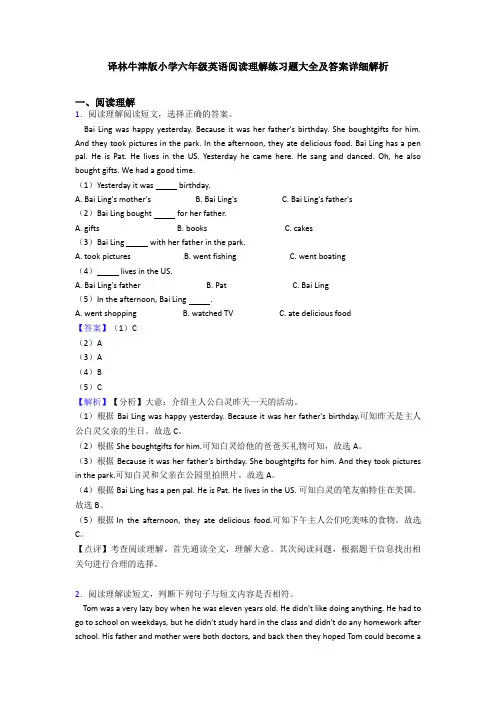
译林牛津版小学六年级英语阅读理解练习题大全及答案详细解析一、阅读理解1.阅读理解阅读短文,选择正确的答案。
Bai Ling was happy yesterday. Because it was her father's birthday. She boughtgifts for him. And they took pictures in the park. In the afternoon, they ate delicious food. Bai Ling has a pen pal. He is Pat. He lives in the US. Yesterday he came here. He sang and danced. Oh, he also bought gifts. We had a good time.(1)Yesterday it was birthday.A. Bai Ling's mother'sB. Bai Ling'sC. Bai Ling's father's(2)Bai Ling bought for her father.A. giftsB. booksC. cakes(3)Bai Ling with her father in the park.A. took picturesB. went fishingC. went boating(4) lives in the US.A. Bai Ling's fatherB. PatC. Bai Ling(5)In the afternoon, Bai Ling .A. went shoppingB. watched TVC. ate delicious food【答案】(1)C(2)A(3)A(4)B(5)C【解析】【分析】大意:介绍主人公白灵昨天一天的活动。
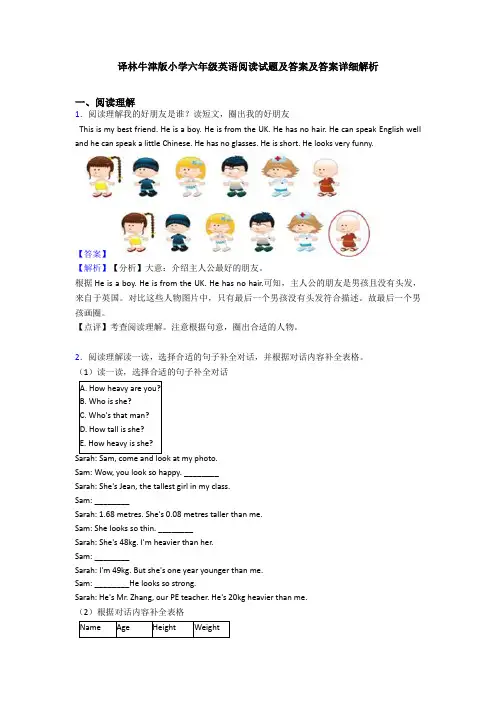
译林牛津版小学六年级英语阅读试题及答案及答案详细解析一、阅读理解1.阅读理解我的好朋友是谁?读短文,圈出我的好朋友This is my best friend. He is a boy. He is from the UK. He has no hair. He can speak English well and he can speak a little Chinese. He has no glasses. He is short. He looks very funny.【答案】【解析】【分析】大意:介绍主人公最好的朋友。
根据He is a boy. He is from the UK. He has no hair.可知,主人公的朋友是男孩且没有头发,来自于英国。
对比这些人物图片中,只有最后一个男孩没有头发符合描述。
故最后一个男孩画圈。
【点评】考查阅读理解。
注意根据句意,圈出合适的人物。
2.阅读理解读一读,选择合适的句子补全对话,并根据对话内容补全表格。
(1)读一读,选择合适的句子补全对话A. How heavy are you?B. Who is she?C. Who's that man?D. How tall is she?E. How heavy is she?Sam: Wow, you look so happy. ________Sarah: She's Jean, the tallest girl in my class.Sam: ________Sarah: 1.68 metres. She's 0.08 metres taller than me.Sam: She looks so thin. ________Sarah: She's 48kg. I'm heavier than her.Sam: ________Sarah: I'm 49kg. But she's one year younger than me.Sam: ________He looks so strong.Sarah: He's Mr. Zhang, our PE teacher. He's 20kg heavier than me.(2)根据对话内容补全表格Name Age Height Weight(2)1.6metres;49kg;11;1.68metres;69kg【考点】阅读理解【解析】【分析】(1)A. How heavy are you?你多重?B. Who is she?她是谁?C. Who's that man?那个人是谁?D. How tall is she?她多高?E. How heavy is she?她多重?①根据下文She's Jean她是Jean。
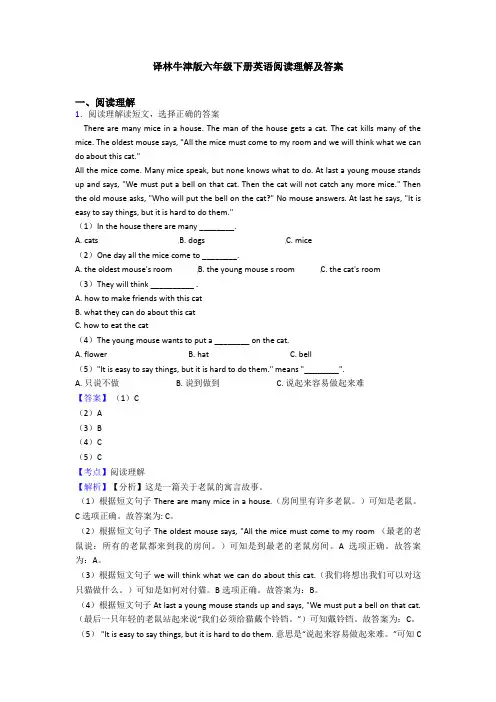
译林牛津版六年级下册英语阅读理解及答案一、阅读理解1.阅读理解读短文,选择正确的答案There are many mice in a house. The man of the house gets a cat. The cat kills many of the mice. The oldest mouse says, "All the mice must come to my room and we will think what we can do about this cat."All the mice come. Many mice speak, but none knows what to do. At last a young mouse stands up and says, "We must put a bell on that cat. Then the cat will not catch any more mice." Then the old mouse asks, "Who will put the bell on the cat?" No mouse answers. At last he says, "It is easy to say things, but it is hard to do them."(1)In the house there are many ________.A. catsB. dogsC. mice(2)One day all the mice come to ________.A. the oldest mouse's roomB. the young mouse s roomC. the cat's room(3)They will think __________ .A. how to make friends with this catB. what they can do about this catC. how to eat the cat(4)The young mouse wants to put a ________ on the cat.A. flowerB. hatC. bell(5)"It is easy to say things, but it is hard to do them." means "________".A. 只说不做B. 说到做到C. 说起来容易做起来难【答案】(1)C(2)A(3)B(4)C(5)C【考点】阅读理解【解析】【分析】这是一篇关于老鼠的寓言故事。
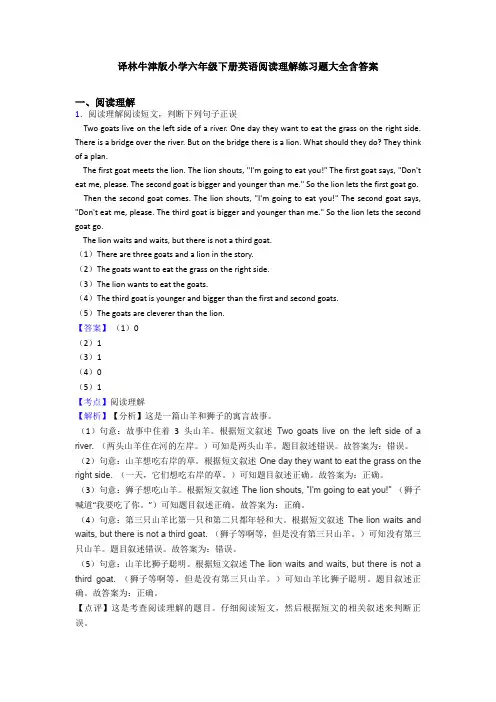
译林牛津版小学六年级下册英语阅读理解练习题大全含答案一、阅读理解1.阅读理解阅读短文,判断下列句子正误Two goats live on the left side of a river. One day they want to eat the grass on the right side. There is a bridge over the river. But on the bridge there is a lion. What should they do? They think of a plan.The first goat meets the lion. The lion shouts, "I'm going to eat you!" The first goat says, "Don't eat me, please. The second goat is bigger and younger than me." So the lion lets the first goat go. Then the second goat comes. The lion shouts, "I'm going to eat you!" The second goat says, "Don't eat me, please. The third goat is bigger and younger than me." So the lion lets the second goat go.The lion waits and waits, but there is not a third goat.(1)There are three goats and a lion in the story.(2)The goats want to eat the grass on the right side.(3)The lion wants to eat the goats.(4)The third goat is younger and bigger than the first and second goats.(5)The goats are cleverer than the lion.【答案】(1)0(2)1(3)1(4)0(5)1【考点】阅读理解【解析】【分析】这是一篇山羊和狮子的寓言故事。
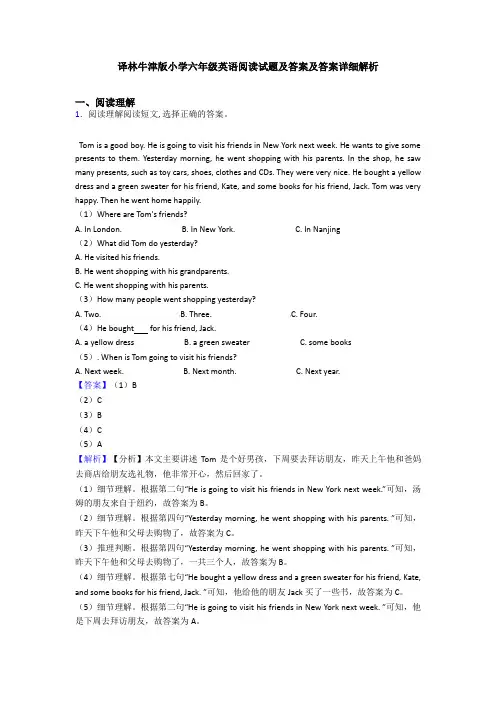
译林牛津版小学六年级英语阅读试题及答案及答案详细解析一、阅读理解1.阅读理解阅读短文, 选择正确的答案。
Tom is a good boy. He is going to visit his friends in New York next week. He wants to give some presents to them. Yesterday morning, he went shopping with his parents. In the shop, he saw many presents, such as toy cars, shoes, clothes and CDs. They were very nice. He bought a yellow dress and a green sweater for his friend, Kate, and some books for his friend, Jack. Tom was very happy. Then he went home happily.(1)Where are Tom's friends?A. In London.B. In New York.C. In Nanjing(2)What did Tom do yesterday?A. He visited his friends.B. He went shopping with his grandparents.C. He went shopping with his parents.(3)How many people went shopping yesterday?A. Two.B. Three.C. Four.(4)He bought for his friend, Jack.A. a yellow dressB. a green sweaterC. some books(5). When is Tom going to visit his friends?A. Next week.B. Next month.C. Next year.【答案】(1)B(2)C(3)B(4)C(5)A【解析】【分析】本文主要讲述Tom是个好男孩,下周要去拜访朋友,昨天上午他和爸妈去商店给朋友选礼物,他非常开心,然后回家了。
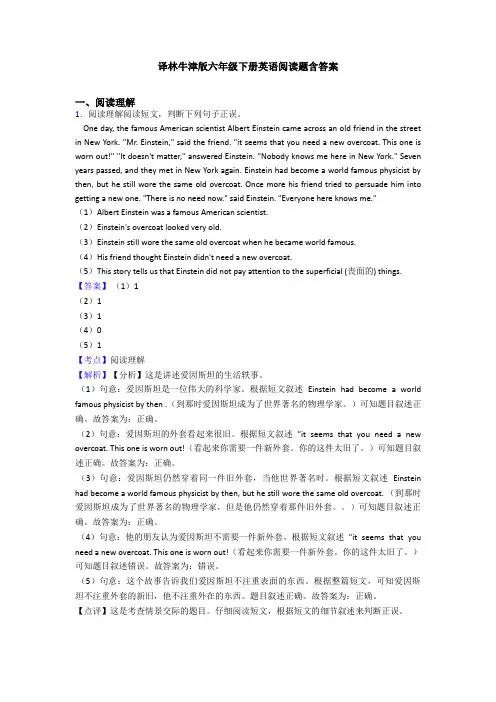
译林牛津版六年级下册英语阅读题含答案一、阅读理解1.阅读理解阅读短文,判断下列句子正误。
One day, the famous American scientist Albert Einstein came across an old friend in the street in New York. "Mr. Einstein," said the friend. "it seems that you need a new overcoat. This one is worn out!" "It doesn't matter," answered Einstein. "Nobody knows me here in New York." Seven years passed, and they met in New York again. Einstein had become a world famous physicist by then, but he still wore the same old overcoat. Once more his friend tried to persuade him into getting a new one. "There is no need now." said Einstein. "Everyone here knows me."(1)Albert Einstein was a famous American scientist.(2)Einstein's overcoat looked very old.(3)Einstein still wore the same old overcoat when he became world famous.(4)His friend thought Einstein didn't need a new overcoat.(5)This story tells us that Einstein did not pay attention to the superficial (丧面的) things. 【答案】(1)1(2)1(3)1(4)0(5)1【考点】阅读理解【解析】【分析】这是讲述爱因斯坦的生活轶事。
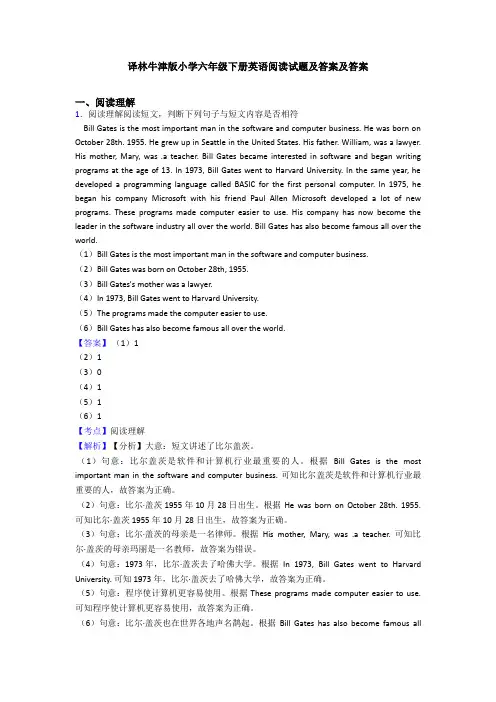
译林牛津版小学六年级下册英语阅读试题及答案及答案一、阅读理解1.阅读理解阅读短文,判断下列句子与短文内容是否相符Bill Gates is the most important man in the software and computer business. He was born on October 28th. 1955. He grew up in Seattle in the United States. His father. William, was a lawyer. His mother, Mary, was .a teacher. Bill Gates became interested in software and began writing programs at the age of 13. In 1973, Bill Gates went to Harvard University. In the same year, he developed a programming language called BASIC for the first personal computer. In 1975, he began his company Microsoft with his friend Paul Allen Microsoft developed a lot of new programs. These programs made computer easier to use. His company has now become the leader in the software industry all over the world. Bill Gates has also become famous all over the world.(1)Bill Gates is the most important man in the software and computer business.(2)Bill Gates was born on October 28th, 1955.(3)Bill Gates's mother was a lawyer.(4)In 1973, Bill Gates went to Harvard University.(5)The programs made the computer easier to use.(6)Bill Gates has also become famous all over the world.【答案】(1)1(2)1(3)0(4)1(5)1(6)1【考点】阅读理解【解析】【分析】大意:短文讲述了比尔盖茨。
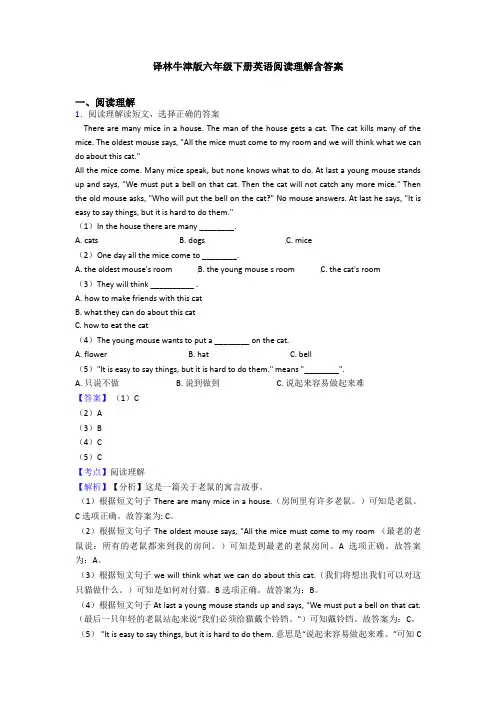
译林牛津版六年级下册英语阅读理解含答案一、阅读理解1.阅读理解读短文,选择正确的答案There are many mice in a house. The man of the house gets a cat. The cat kills many of the mice. The oldest mouse says, "All the mice must come to my room and we will think what we can do about this cat."All the mice come. Many mice speak, but none knows what to do. At last a young mouse stands up and says, "We must put a bell on that cat. Then the cat will not catch any more mice." Then the old mouse asks, "Who will put the bell on the cat?" No mouse answers. At last he says, "It is easy to say things, but it is hard to do them."(1)In the house there are many ________.A. catsB. dogsC. mice(2)One day all the mice come to ________.A. the oldest mouse's roomB. the young mouse s roomC. the cat's room(3)They will think __________ .A. how to make friends with this catB. what they can do about this catC. how to eat the cat(4)The young mouse wants to put a ________ on the cat.A. flowerB. hatC. bell(5)"It is easy to say things, but it is hard to do them." means "________".A. 只说不做B. 说到做到C. 说起来容易做起来难【答案】(1)C(2)A(3)B(4)C(5)C【考点】阅读理解【解析】【分析】这是一篇关于老鼠的寓言故事。
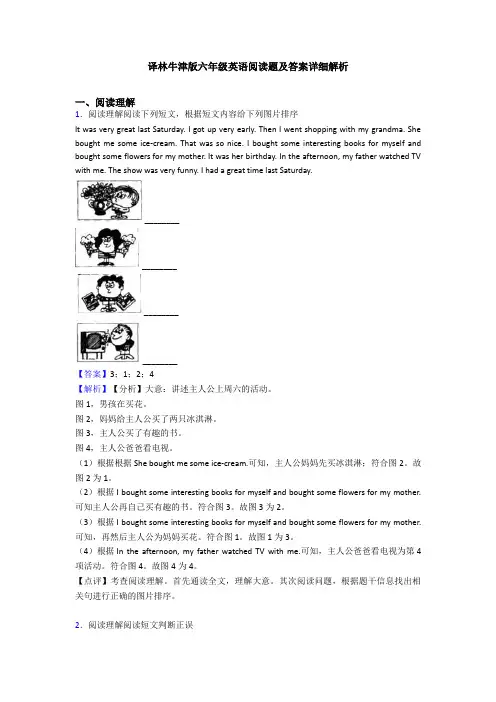
译林牛津版六年级英语阅读题及答案详细解析一、阅读理解1.阅读理解阅读下列短文,根据短文内容给下列图片排序It was very great last Saturday. I got up very early. Then I went shopping with my grandma. She bought me some ice-cream. That was so nice. I bought some interesting books for myself and bought some flowers for my mother. It was her birthday. In the afternoon, my father watched TV with me. The show was very funny. I had a great time last Saturday.________________________________【答案】3;1;2;4【解析】【分析】大意:讲述主人公上周六的活动。
图1,男孩在买花。
图2,妈妈给主人公买了两只冰淇淋。
图3,主人公买了有趣的书。
图4,主人公爸爸看电视。
(1)根据根据She bought me some ice-cream.可知,主人公妈妈先买冰淇淋;符合图2。
故图2为1。
(2)根据I bought some interesting books for myself and bought some flowers for my mother. 可知主人公再自己买有趣的书。
符合图3。
故图3为2。
(3)根据I bought some interesting books for myself and bought some flowers for my mother. 可知,再然后主人公为妈妈买花。
符合图1。
故图1为3。
(4)根据In the afternoon, my father watched TV with me.可知,主人公爸爸看电视为第4项活动。
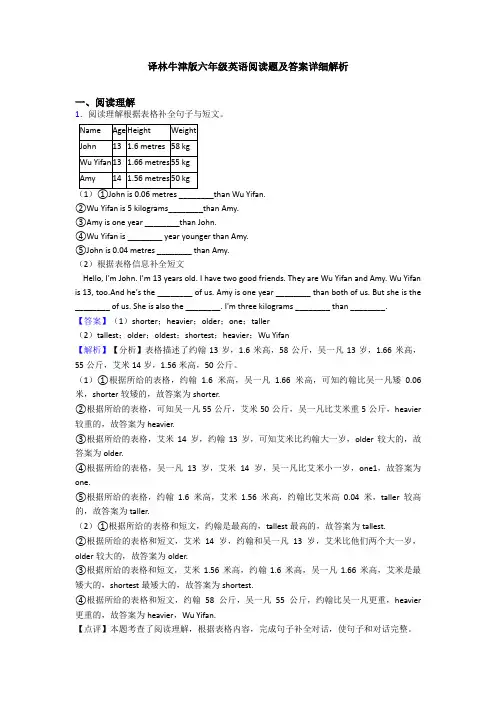
译林牛津版六年级英语阅读题及答案详细解析一、阅读理解1.阅读理解根据表格补全句子与短文。
②Wu Yifan is 5 kilograms________than Amy.③Amy is one year ________than John.④Wu Yifan is ________ year younger than Amy.⑤John is 0.04 metres ________ than Amy.(2)根据表格信息补全短文Hello, I'm John. I'm 13 years old. I have two good friends. They are Wu Yifan and Amy. Wu Yifan is 13, too.And he's the ________ of us. Amy is one year ________ than both of us. But she is the ________ of us. She is also the ________. I'm three kilograms ________ than ________.【答案】(1)shorter;heavier;older;one;taller(2)tallest;older;oldest;shortest;heavier;Wu Yifan【解析】【分析】表格描述了约翰13岁,1.6米高,58公斤,吴一凡13岁,1.66米高,55公斤,艾米14岁,1.56米高,50公斤。
(1)①根据所给的表格,约翰 1.6米高,吴一凡 1.66米高,可知约翰比吴一凡矮0.06米,shorter较矮的,故答案为shorter.②根据所给的表格,可知吴一凡55公斤,艾米50公斤,吴一凡比艾米重5公斤,heavier 较重的,故答案为heavier.③根据所给的表格,艾米14岁,约翰13岁,可知艾米比约翰大一岁,older较大的,故答案为older.④根据所给的表格,吴一凡13岁,艾米14岁,吴一凡比艾米小一岁,one1,故答案为one.⑤根据所给的表格,约翰1.6米高,艾米1.56米高,约翰比艾米高0.04米,taller较高的,故答案为taller.(2)①根据所给的表格和短文,约翰是最高的,tallest最高的,故答案为tallest.②根据所给的表格和短文,艾米14岁,约翰和吴一凡13岁,艾米比他们两个大一岁,older较大的,故答案为older.③根据所给的表格和短文,艾米1.56米高,约翰1.6米高,吴一凡1.66米高,艾米是最矮大的,shortest最矮大的,故答案为shortest.④根据所给的表格和短文,约翰58公斤,吴一凡55公斤,约翰比吴一凡更重,heavier 更重的,故答案为heavier,Wu Yifan.【点评】本题考查了阅读理解,根据表格内容,完成句子补全对话,使句子和对话完整。
译林牛津版六年级下册英语阅读题含答案一、阅读理解1.阅读理解读下两这封信,回答问题Dear Mum,How are you? Every day I had fun with my cousins. On Monday we went to a restaurant. We ate good food. On Tuesday we went to a park. We sang and danced. On Wednesday we played ping-pong. On Thursday we climbed a mountain. We took many pictures. Tomorrow I'll be back home!Miss you and dad.Love.John (1)What did John do on Monday?(2)Where did John go on Tuesday?(3)What did John do on Tuesday?(4)Did John play badminton on Wednesday?(5)Did John climb a mountain on Thursday?【答案】(1)He ate good food.(2)He went to a park.(3)He sang and danced.(4)No, he didn't.(5)Yes, he did.【考点】阅读理解【解析】【分析】这是写给父母,介绍自己一周生活情况的信。
(1)根据短文叙述 On Monday we went to a restaurant. We ate good food. (周一我们去了饭店。
我们吃了美食。
)可知周一吃美食。
故答案为: He ate good food.(2)根据短文叙述 On Tuesday we went to a park. (周二我们去了公园。
译林牛津版小学六年级下册英语阅读理解及答案一、阅读理解1.阅读理解阅读短文,判断正误Mr. White has a daughter and a son. They live in the countryside. It is near a mountain. They were very poor before. They had little money. They bought some seeds. They planted rice, carrots and beans in the field. They worked very hard,and they were very happy.One day, some big birds came. They ate the rice, the beans and the carrots. Mr. White was very angry. He got the birds out of his field, and then he put some scarecrows(稻草人)in the field. There are no birds now. In autumn, Mr. White has got a lot of beans, carrots and rice. The Whites are happy again. They are not poor now.(1)Mr. White has two children.(2)The Whites live in the countryside and it is far from a mountain.(3)The Whites didn't buy any seeds with their money.(4)Mr. White put some scarecrows in the field.(5)Mr. White got lots of rice and vegetables in winter at last.【答案】(1)1(2)0(3)0(4)1(5)0【考点】阅读理解【解析】【分析】文章大意:介绍怀特先生一家在乡村种庄稼的事情。
译林牛津版六年级英语阅读题含答案详细解析一、阅读理解1.阅读理解阅读短文,完成下列任务There are four people in Lily's family. Here's some information(信息)about her family. Her father's name is John. He is 187 cm and 92 kg. He's a tall man and looks very strong. Linda is her mother, she is a very short woman and looks fat. She's 149 cm and 67 kg. Her elder brother looks very thin, he's 176 cm and 57 kg. His name is Bob. Lily is shorter but heavier than her elder brother. She's 166 cm and 59 kg.(1)根据短文信息完成下列表格。
Interviewer: Hi, Lily. May I ask you some questions about your family?Lily: Sure! Go ahead.Interviewer:________Lily: There are four. They're my father, my mother, my brother and me.Interviewer: Who's the tallest one in your family?Lily: My father, of course.Interviewer: ________Lily: He's 1.87 metres.Interviewer: Is your father taller and stronger than your brother?Lily: ________ He's very thin. And I'm heavier than him.Interviewer: ________Lily: I'm 59 kg.;1.66 metres(2)How many people are there in your family?;How tall is he?;Yes, he is.;How heavy are you?【解析】【分析】短文描述了莉莉家有四口人,她父亲的名字叫约翰。
译林牛津版小学六年级英语阅读理解练习题含答案详细解析一、阅读理解1.阅读理解阅读理解Jack was busy last Sunday. His parents were not at home. He walked to the park in the morning. He read English books and did sports there.Then he visited his friend Tom. Tom is his best friend. He is younger and shorter than Jack.They played puzzles together.After lunch, Jack went back home. In the afternoon, Jack cleaned the room and washed the clothes. After finishing these things, his parents got home.Jack had a nice dinner with his parents. At 10 o'clock, he went to bed.(1)Jack's parents stayed at home last Sunday.(2)Jack walked to the park in the morning.(3)Tom is stronger and taller than Jack.(4)Tom and Jack played football together.(5)Jack went to bed at 9 o'clock.【答案】(1)0(2)1(3)0(4)0(5)0【解析】【分析】该短文主要介绍上星期天杰克干的事情。
(1)细节阅读,根据His parents were not at home. 得知上周日他父母不在家,故答案为:错误。
译林牛津版小学六年级英语阅读理解练习题大全含答案详细解析一、阅读理解1.阅读理解阅读短文,根据短文内容填空。
Today is Saturday. It's a nice day. John and Jim go to a nature park. There is a big forest in the park. There is a beautiful lake near the forest and they can see some fish in it. There is a bridge over the river. They take some pictures on the bridge. There is a mountain in the park. They want to climb mountains, but they have no time.(1)John and Jim go to a nature ________today.(2)There is a beautiful lake ________the forest in the park.(3)John and Jim see some fish ________ the lake.(4)John and Jim take pictures on the ________.(5)They want to ________ mountains, but they have no time.【答案】(1)park(2)near(3)in(4)bridge(5)climb【考点】阅读理解【解析】【分析】这是介绍John和Jim去自然公园的情况。
(1)根据短文叙述 John and Jim go to a nature park. (John和Jim去了自然公园。
)可知应填park。
故答案为:park。
译林牛津版小学六年级英语阅读理解练习题及答案详细解析一、阅读理解1.阅读理解阅读理解You may know the names of the sportsmen. You may also know what sports they are good at. Let me tell you more about them.Yao Ming is older than Liu Xiang and Wang Hao. But he is younger than Tian Liang. Yao Ming is 2. 26 metres, and is taller than the others. Tian Liang is older than the other three, but he is shorter than them.Liu Xiang and Wang Hao were born in the same year. Wang Hao is a little younger and shorter than Liu Xiang. Liu Xiang runs faster than the others.(1)Yao Ming is ________ of them.A. the tallestB. tallerC. much taller(2)Yao Ming is ________ than Wang Hao.A. olderB. youngerC. shorter(3)Tian Liang is ________ than Liu Xiang and Wang Hao.A. youngerB. tallerC. older(4)4. ________ were born in the same year.A. Yao Ming and Liu XiangB. Liu Xiang and Wang HaoC. Tian Liang and Liu Xiang(5)Liu Xiang runs ________ than the other three.A. slowlyB. fastestC. faster【答案】(1)A(2)A(3)C(4)B(5)C【解析】【分析】这是一篇介绍姚明等著名运动员情况的短文.(1)这是细节理解, 根据短文叙述Yao Ming is 2. 26 metres, and is taller than the others. (姚明2.26米, 比其他人都高.)可知他是最高的. B选项和C选项都是比较级, 不适合题意, 只有A 选项是最高级, 适合题意. 故答案为: A.(2)这是细节理解, 根据短文叙述 Yao Ming is older than Liu Xiang and Wang Hao. (姚明比刘翔和王皓年龄大.) 可知应选older, younger"较年轻", 和shorter"较矮"意思不适合. 故答案为: A.(3)这是推理判断, 根据短文叙述这是细节理解, 根据短文叙述Yao Ming is older than Liu Xiang and Wang Hao. But he is younger than Tian Liang. (姚明比刘翔和王皓年龄大. 可是他比田亮年龄小.)可知田亮年龄最大. 因此选older. 故答案为: C.(4)这是细节理解, 根据短文叙述Liu Xiang and Wang Hao were born in the same year. (刘翔和王皓同年出生.) 可知应选B. 故答案为: B.(5)这是细节理解, 根据短文叙述Liu Xiang runs faster than the others.(刘翔比其他人都跑得快.)可知应选faster"较快", A选项是"慢",意思不适合 B选项是最高级, 这是比较级的句子, 不适合. 故答案为: C.【点评】这是考查阅读能力的题目. 短文中主要运用了比较级, 要掌握比较级, 并能够通过句子叙述, 理解正确的意思.2.阅读理解阅读理解。
译林牛津版小学六年级下册英语阅读理解练习题及答案一、阅读理解1.阅读理解阅读短文,判断下列句子与短文内容是否相符Bill Gates is the most important man in the software and computer business. He was born on October 28th. 1955. He grew up in Seattle in the United States. His father. William, was a lawyer. His mother, Mary, was .a teacher. Bill Gates became interested in software and began writing programs at the age of 13. In 1973, Bill Gates went to Harvard University. In the same year, he developed a programming language called BASIC for the first personal computer. In 1975, he began his company Microsoft with his friend Paul Allen Microsoft developed a lot of new programs. These programs made computer easier to use. His company has now become the leader in the software industry all over the world. Bill Gates has also become famous all over the world.(1)Bill Gates is the most important man in the software and computer business.(2)Bill Gates was born on October 28th, 1955.(3)Bill Gates's mother was a lawyer.(4)In 1973, Bill Gates went to Harvard University.(5)The programs made the computer easier to use.(6)Bill Gates has also become famous all over the world.【答案】(1)1(2)1(3)0(4)1(5)1(6)1【考点】阅读理解【解析】【分析】大意:短文讲述了比尔盖茨。
(1)句意:比尔盖茨是软件和计算机行业最重要的人。
根据Bill Gates is the most important man in the software and computer business. 可知比尔盖茨是软件和计算机行业最重要的人,故答案为正确。
(2)句意:比尔·盖茨1955年10月28日出生。
根据He was born on October 28th. 1955. 可知比尔·盖茨1955年10月28日出生,故答案为正确。
(3)句意:比尔·盖茨的母亲是一名律师。
根据His mother, Mary, was .a teacher. 可知比尔·盖茨的母亲玛丽是一名教师,故答案为错误。
(4)句意:1973年,比尔·盖茨去了哈佛大学。
根据In 1973, Bill Gates went to Harvard University. 可知1973年,比尔·盖茨去了哈佛大学,故答案为正确。
(5)句意:程序使计算机更容易使用。
根据 These programs made computer easier to use. 可知程序使计算机更容易使用,故答案为正确。
(6)句意:比尔·盖茨也在世界各地声名鹊起。
根据Bill Gates has also become famous allover the world. 可知比尔·盖茨也在世界各地声名鹊起,故答案为正确。
【点评】本题考查了阅读理解,先翻译短文,然后根据短文内容,判断句子正确或错误。
2.阅读理解阅读理解Some animals collect their winter food in the autumn. In the winter, they just stay at home and eat the food they collect in the autumn. For example, squirrels collect seeds and nuts, and beavers collect sticks.Many birds cannot find food in the winter, so they fly from the north to the south in the autumn. They fly back the next spring. For example, swans and wild geese fly away in the autumn, because they can find food in the warm south.Some animals sleep for a long time in the winter. They eat a lot of food in the autumn. In the winter, they do not eat anything. They are hungry when they wake up in the spring. They usually look for food in March or April. Bears, snakes and frogs are such animals.Winter is cold in many countries, but these smart animals can spend it safely.Questions:(1)What do squirrels collect for winter in autumn?(2)Why swans and wild geese fly away in the autumn?(3)When does the snake look for food when they wake up?(4)Which animal collect their winter food in the autumn?【答案】(1)Squirrels collect seeds and nuts.(2)Because they can find food in the warm south.(3)In March or April.(4)The squirrels and beavers【考点】阅读理解【解析】【分析】大意:短文讲述了有些动物在秋天采集冬季食物,准备过冬,许多鸟在秋天从北方飞到南方找到食物,有些短文冬眠。
(1)句意:松鼠在秋天冬天收集什么?根据For example, squirrels collect seeds and nuts, and beavers collect sticks. 可知松鼠收集种子和坚果,故答案为Squirrels collect seeds and nuts.(2)句意:为什么天鹅和大雁会在秋天飞走?根据Many birds cannot find food in the winter, so they fly from the north to the south in the autumn. 可知因为他们能在温暖的南方找到食物,故答案为 Because they can find food in the warm south.(3)句意:当蛇醒来时,它们什么时候寻找食物?根据 They usually look for food in March or April. Bears, snakes and frogs are such animals. 可知三月或四月,故答案为 In March or April.(4)句意:哪种动物在秋天采集冬季食物?根据In the winter, they just stay at home and eat the food they collect in the autumn. For example, squirrels collect seeds and nuts, and beavers collect sticks. ,可知松鼠和海狸,故答案为 The squirrels and beavers【点评】本题考查了阅读理解,首先通读短文,理解大意;其次阅读题干,根据题干信息找出相关句进行回答。
3.阅读理解阅读理解Thanksgiving is a family holiday in autumn in Canada and the USA. In Canada, Thanksgiving is in October. In the USA, it is in November. On Thanksgiving, people have a big dinner with their family. They usually eat roast turkey and other delicious food. They also tell Thanksgiving stories and give thanks to their friends and families.In China, we also have a family holiday in autumn. It is Mid-Autumn Festival. People get together with their families to have a big dinner, too. They eat mooncakes, talk happily and enjoy looking at the beautiful round moon. Mooncakes are round like the full moon. Some people cannot go back home, but they can look at the moon and think about their families.(1)When is Thanksgiving?(2)What people usually eat at Thanksgiving?(3)What does the mooncake look like?(4)What is the common point between Thanksgiving and Mid-Autumn Festival?【答案】(1)In October or November.(2)They usually eat roast turkey and other delicious food.(3)Mooncakes are round like the full moon.(4)People get together have a big dinner with their families.【考点】阅读理解【解析】【分析】大意:短文讲述了感恩节和中秋节。